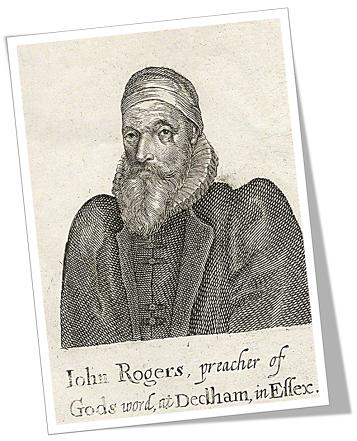A Boanerges and a Barnabas
A Boanerges and a Barnabas

When John Rogers (1570-1636) first went up to Emmanuel College, Cambridge, as a student in February 1588, he proved to be a complete waste. His way was being paid by his uncle, the well-known Puritan preacher Richard Rogers (1551-1618), but John sold all of his books to spend the proceeds on various sinful activities. Not surprisingly, Emmanuel College, a hotbed of Puritan theology and piety, asked John to leave. Richard Rogers's wife convinced her husband to give the young man another chance. So John went up again to Cambridge, only to prove the profligate once more, again selling his books and squandering money on his vices. His uncle would have washed his hands of him, but, yielding to the entreaties of his wife, Richard sent John to Cambridge a third time. This time things proved quite different, as a long-suffering God saved the young man. Richard later confessed, "I will never despair of a man for John Rogers's sake."
Most of John Rogers's pastoral ministry was spent at what was then a Puritan stronghold in the parish of Dedham, Essex. He came to the Dedham church in 1605, and served there as a lecturer until his death thirty-one years later. A number of Puritan leaders who had conscientious objections about aspects of the liturgy of the Church of England served as lecturers because this enabled them to preach, usually on Sunday afternoons, outside the framework of the typical Anglican service.
According to Puritan Sidrach Simpson, Rogers was an extraordinary preacher, both a Boanerges, a Son of Thunder (Mark 3:17), and a Barnabas, a Son of Consolation (Acts 4:36), through whose preaching "the stout hearts of many rebellious" sinners were humbled and led in submission to Christ. Is this not what biblical preaching should be: prophetic in its denunciation of sin but sweet in gospel comfort to sinners?
The great Puritan theologian Thomas Goodwin (1600-1680) was present on one occasion when, during his sermon, Rogers took the part of God, angry with His people for not prizing and reading the Scriptures. He threatened to take away the Bible from such an ungrateful people. Rogers then impersonated the people, falling to his knees in the pulpit and pleading with God not to give them a famine of hearing the Word of God:
Lord, whatsoever thou dost to us, take not thy Bible from us; kill our children, burn our houses, destroy our goods, only spare us thy Bible, take not away thy Bible.
The sermon's impact was electrifying. Many of the people in the church were smitten in their consciences and reduced to copious weeping in repentance. Goodwin himself, not yet converted, was brought under deep conviction of sin. When he came out of the church, he was so overwhelmed with tears that he stood leaning on the neck of his horse for fifteen minutes or so before he had the strength to mount. The Puritans long prayed and labored for a national awakening, and though these prayers and labors did not see an answer in their lifetime – such an awakening was to come in the eighteenth century – Rogers's sermon gives a foretaste of the remarkable scenes of revival in the next century. Here is great encouragement not to give up praying if we do not see immediate fruit. Praying breath is never lost.
Among Rogers's few publications was A Treatise of Love, which resulted from a series of sermons on 1 John 3:23:
And this is his commandment, That we should believe on the name of his Son Jesus Christ, and love one another, as he gave us commandment.
It is often said that the Puritans had little vision for evangelism beyond their own world, but a quick perusal of this work raises questions about the truth of this assumption.

One mark of true love for God, Roger asserts, is that it longs for others to love God as well and so seeks to draw as many to God as it can, as Philip did Nathanael ( John 1:44-46) and Andrew did Peter (1:40-42) (A Treatise of Love, pp. 18-19). In fact, Christian love has a global reach, for it "reacheth to all, near and far, strangers, enemies, within and without the pale of the Church, Turks (Muslims) and pagans, we must pray for them, and do them any good if they come in our way" (p. 41). What is more, "we must pray for the poor pagans, that God would send His light and truth among them, that they in time may be brought into the bosom of the Church, and the sheepfold of Christ Jesus" (p. 140). God also answered these prayers in His time – in the late eighteenth century, we see the advent of the modern missionary movement.
It is little wonder, when we see such a powerful love of the Word in Rogers's pulpit ministry and his love for the lost, that later generations of Christians have delighted in Puritan literature and have sought to be set on fire for God by reading their books and meditating on their vision of God.

Add new comment